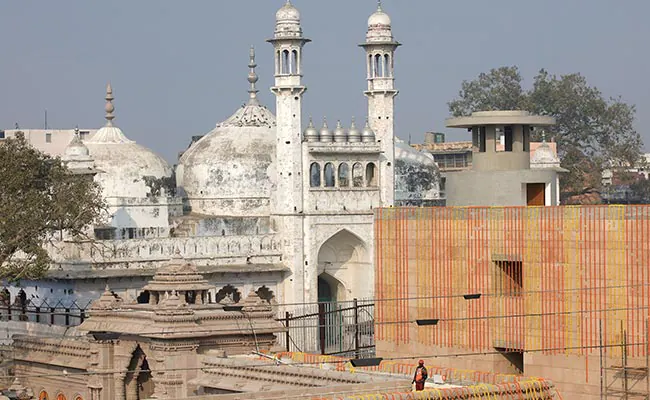
A Fast Track court in Varanasi has dismissed the application filed by Anjuman Masjid Committee challenging the maintainability of suit filed by General Secretary of Vishwa Vedic Sanatan Sangh seeking a ban on the entry of Muslims into the Gyanvapi complex and permission to offer prayers at the “Shivling”.
Judge Mahendra Kumar Pandey of Fastrack Court, Varanasi dismissed the plea filed under Order 7 Rule 11, CPC (Civil Procedure Code) and has now posted the suit for hearing on December 2, 2022.
On May 24, plaintiff Kiran Singh, who is general secretary of the Vishwa Vedic Sanatan Sangh, had filed the suit in the Varanasi district court seeking a ban on the entry of Muslims into the Gyanvapi complex, handing over the complex to the Sanatan Sangh and permission to offer prayers at the “Shivling”.
On May 25, district court Judge A K Vishvesh had ordered the transfer of the suit to a fast track court.
Varanasi district magistrate, police commissioner, Anjuman Intezamia Committee that is managing the Gyanvapi mosque, and Vishwanath Temple Trust were made respondents in the suit.
Owing to the multiplicity of suits and applications and pleas being filed at various for a, relating to the dispute over Gyanvapi mosque, one is bound to be confused, which suit is being heard and where. To avoid any ambiguity, we clarify that this suit is not connected to, but running parallel to the suit filed by 5 Hindu women seeking rights to pray in the Gyanvapi mosque premises.
A Similar suit
The suit filed by the 5 Hindu women was also challenged for its maintainability by the Masjid Committee and the same was dismissed by a Varanasi District Court Judge Ajay Krishna Vishvesha on September 12. It is also known as the Shringar Gauri suit as the women plaintiffs seek access to what they say was the Maa Shringar Gauri shrine located behind the western wall of the mosque complex.
On April 26, the Varanasi court ordered a videographic survey of the Gyanvapi complex. The Masjid Committee challenged this order before the Allahabad High Court which was dismissed on April 21. On May 6, the inspection began amidst heavy security and on May 16, the court was informed by the Hindu side that a shivling was found inside a pond in the mosque complex. On the same day, the court directed the District Magistrate to seal the place where shivling has been recovered. This order a day before the Supreme Court was set to hear the Masjid Committee’s plea challenging the Allahabad High Court order which had dismissed their appeal against this survey.
On October 14, the Varanasi Court rejected the plea for scientific investigation of the purported ‘shivling’ which was allegedly found during survey of Gyanvapi mosque. A revision plea was filed before Allahabad High Court seeking directions to ASI to conduct scientific probe of the ‘shivling’ through carbon dating, ground penetrating radar and excavation. The court adjourned the hearing to November 28 and extended interim stay on the lower court’s order for ASI survey until November 30.
On November 11, the apex court extended the interim protection granted by it in May which stated that the ‘Shivling’ will remain protected without obstructing right to offer namaz at Gyanvapi.
Related:
Gyanvapi case: AIM finally gets copy of survey report
Gyanvapi case: Varanasi court rejects plea to conduct carbon dating test of “shivling”
Gyanvapi case: Rift widens between Shringar Gauri plaintiffs
Gyanvapi Case: Copy-Paste Pattern a la Babri Case – Not Just Legally But Politically, Too?